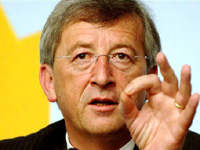EU urges China to strengthen yuan vs euro

China must allow stronger currency of its yang against euro or face a possible protectionist backlash over Europe 's massive trade deficit with the Asian trading giant, the EU financial officials warned Wednesday.
The yuan's comparative weakness against the euro makes Chinese exports relatively cheap, fueling China's trade surplus and "creating a lot of problems to the European economy," said Jean-Claude Juncker, Luxembourg's prime minister and finance minister.
"It could have the result that a protectionist reaction could occur in Europe," said Juncker, speaking as head of a committee of eurozone finance ministers known as the Eurogroup.
He said he and the other members were befuddled by the euro's continued strength against the yuan, even as the Chinese currency gains steadily against the dollar.
"It is difficult to understand, whereas China is exporting less to the U.S. than to the Europe, why the yuan is appreciating vis-a-vis the dollar and why the yuan is depreciating against the euro," Juncker told reporters at the end of a visit to Beijing.
"We do think we have to correct this obvious imbalance," Juncker said.
Juncker, European Central Bank President Jean-Claude Trichet and EU Economic and Monetary Affairs Commissioner Joaquin Almunia traveled to China for talks with Premier Wen Jiabao and other officials. Discussions covered currency markets and other economic issues, although neither side indicated new breakthroughs.
Europe's growing frustration over Chinese trading practices increasingly mirrors complaints long-heard in the United States.
China, the EU's biggest trading partner, is forecast to see its trade deficit surplus with the region grow from EUR128 billion, or US$190 billion, last year to EUR170 billion, or US$253 billion, this year.
Since the yuan exchange was freed to trade within a narrow band against a basket of currencies in mid-2005, the yuan has strengthened by about 11 percent against the dollar, while weakening around 9 percent against the euro.
On Wednesday, the 13-nation euro fell again against the dollar on speculation the European Central Bank may hold off on further interest rate increases.
In morning European trading the euro bought US$1.4732, down from US$1.4841 the night before in New York. The euro was at 10.89 to the yuan on Wednesday.
Along with the exchange rate woes, European business leaders also complain bitterly of China's rampant intellectual property right violations, the dumping of Chinese products in European markets, and non-tariff barriers that prevent their companies competing in areas such as law and telecommunications.
Separately, Trichet, sought to cool speculation that the dollar's plummeting rate against world currencies would see it supplanted by the euro as the global reserve currency of choice. Such thinking has been spurred in part by suggestions that China may shift more of its foreign currency stockpiles away from the dollar.
Trichet, who has consistently advocated a strong dollar, said his institution was not encouraging moves away from the dollar.
"We never campaigned in favor of the international use of the euro," Trichet said.
Subscribe to Pravda.Ru Telegram channel, Facebook, RSS!


